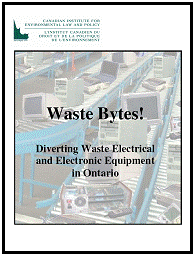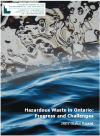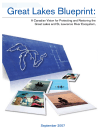|
Winter 2008 Newsletter
What's New in this Issue?
Selected Research and Publications
Government News
Events Calendar
Other CIELAP News
DID YOU KNOW? In 2004 approximately 14,586,000 household appliances, information technology, telecommunications, and audio-visual equipment were discarded in Ontario. Only 1,325,000 of these units (9.1%) were collected for reuse or recycling.[1]
Selected Research and Publications
New CIELAP Publication: Waste Bytes! Diverting Waste Electrical and Electronic Equipment in Ontario (January 2008).
 CIELAP’s report identifies and analyzes the rapidly emerging issue of Waste Electrical and Electronic Equipment (WEEE) in an attempt to help the government of Ontario, municipalities and industry take proactive steps to advance the sustainable management of this waste stream. The paper concludes with 16 recommendations for Ontario and the province’s proposed WEEE diversion Program. Download the full CIELAP report. CIELAP’s report identifies and analyzes the rapidly emerging issue of Waste Electrical and Electronic Equipment (WEEE) in an attempt to help the government of Ontario, municipalities and industry take proactive steps to advance the sustainable management of this waste stream. The paper concludes with 16 recommendations for Ontario and the province’s proposed WEEE diversion Program. Download the full CIELAP report.
Also visit the Ontario Electronic Stewardship website for more information about the province’s proposed WEEE diversion program that is under development in the province.
New CIELAP Publication: Hazardous Waste in Ontario: Progress and Challenges (September 2007)
 Since the time when CIELAP issued its Open for Toxics reports in 2000 and in 2003, the provincial government has made significant progress to address hazardous waste in Ontario. There remain, however, a number of regulatory gaps and many areas for improvement. This paper reports on the progress made and offers recommendations for future improvement in this area. Download the full report. Since the time when CIELAP issued its Open for Toxics reports in 2000 and in 2003, the provincial government has made significant progress to address hazardous waste in Ontario. There remain, however, a number of regulatory gaps and many areas for improvement. This paper reports on the progress made and offers recommendations for future improvement in this area. Download the full report.
New CIELAP Publication: Great Lakes Blueprint: A Canadian Vision for Protecting and Restoring the Great Lakes and St. Lawrence River Ecosystem (September 2007)
 This report is a collaborative effort between CIELAP, Ecojustice, Environmental Defense, Canadian Environmental Law Association, Great Lakes United and Sierra Club of Canada. The Great Lakes Blueprint details eight key priorities for protecting the Great Lakes and St. Lawrence River as a significant natural, cultural and economic entity. These priorities include recommendations on how all levels of government in Canada can restore and protect the Great Lakes, identifying needed improvements to policy and planning. Download the full report. This report is a collaborative effort between CIELAP, Ecojustice, Environmental Defense, Canadian Environmental Law Association, Great Lakes United and Sierra Club of Canada. The Great Lakes Blueprint details eight key priorities for protecting the Great Lakes and St. Lawrence River as a significant natural, cultural and economic entity. These priorities include recommendations on how all levels of government in Canada can restore and protect the Great Lakes, identifying needed improvements to policy and planning. Download the full report.
CIELAP Research in progress: Legal Barriers to Local Food Production, Distribution in the Greenbelt.
CIELAP is preparing a report that will discuss the legal, regulatory and policy barriers that restrict the production, distribution, and sale of local food in the Greenbelt region of Southern Ontario. The report will provide recommendations on how policy makers at the municipal, provincial and national levels can promote and provide the conditions for a more sustainable local food economy. Please contact CIELAP if you are interested in discussing this research in progress.
CIELAP comments on Ontario Ministry of Environment’s proposal to improve the regulatory framework governing the application of non-agricultural source material (NASM) on agricultural land.
Executive Director Anne Mitchell’s comments on the Ministry’s proposal pointed to concerns raised in CIELAP’s 2006 report There is No “Away” on pharmaceuticals, personal care products, and endocrine-disrupting substances detected in water. While some of these emerging contaminants are removed from sewage sludge by wastewater treatment, others are not. Sewage sludge placed on agricultural land as a NASM may have a number of negative consequences, including that these contaminants may be carried in runoff into ground or source water. Given the serious risks that pharmaceuticals and personal care products may pose to the environment and to human health, Anne stressed the need for the Ministry of the Environment to address emerging contaminants such as pharmaceuticals and personal care products in the proposed regulatory framework. Download Anne’s comments.
Government News
Proposed Regulatory Framework for Nanomaterials under the 1999 Canadian Environmental Protection Act.
On September 27, 2007 Health Canada and Environment Canada hosted 55 representatives from a range of sectors at a multi-stakeholder workshop to discuss a Proposed Regulatory Framework for Nanomaterials under the Canadian Environmental Protection Act, 1999. Given the potential for toxicity in nanomaterials and the lack of knowledge about those toxic properties at present, CIELAP and CELA recommended that the framework be developed carefully with strong input from all stakeholders and members of the public, and that the precautionary principle and pollution prevention strategies be applied throughout the work. Download CIELAP and CELA’s joint comments.
Electronics recycling in Nova Scotia.
Phase One of Nova Scotia’s Electronic Product Stewardship Regulations came into effect on February 1, 2008. The goal of the regulations is to divert electronic products from landfills through the creation of a province-wide collection and recycling system for electronic waste. Atlantic Canada Electronics Stewardship (ACES) has established a network of Drop-off Centres where residents and businesses can return select electronic products for recycling. Products being collected during the Phase One of this program include laptop and desktop computers, peripherals, printers, monitors and televisions. See Nova Scotia’s New Electronic Waste Regulations for more information.
Ontario Auditor General’s report addresses hazardous waste.
On December 12, 2007 the CBC reported the Office of the Auditor General of Ontario’s concerns that a “significant” amount of toxic and radioactive waste is likely being disposed of illegally in Ontario because the province isn't taking the necessary steps to monitor the activities of its hazardous waste generators. CIELAP highlighted many of the gaps in regulation of hazardous waste in Ontario in its 2007 Hazardous Waste in Ontario: Progress and Challenges report and Open for Toxics reports (2000 and 2003), and applauds the Auditor General for recognizing this important issue.
Federal Government to close Office of the National Science Advisor
On January 23, 2008 CBC reported that the Federal Government will be closing the Office of the National Science Advisor. Industry Canada confirmed that the office will be phased out when national science advisor Arthur Carty retires on March 31, 2008. Carty, originally appointed to the role of national science advisor in 2004 by then Prime Minister Paul Martin, has been responsible for providing advice on global science and technology issues and making recommendations on how government can better support and benefit from science conducted in-house. CIELAP is concerned about the government’s move and its position that the Science and Technology Council is sufficient to fill the gap left by the closure of the National Science Advisor’s Office. The newly created Science and Technology Council is limited to academic and industry stakeholders with no representation from non-profits and other key stakeholders, and the council is limited to providing a yearly report card on whether federal spending is turning “ideas into innovations” as called for in Industry’s science and technology strategy. This is not good enough and Canada may be left without crucial impartial scientific advice to the detriment of our long-term sustainable development.
Invitations for Public Comment:
Draft Preliminary WEEE Program Plan. Stewards and stakeholders are invited to provide comments on the Ontario Electronic Stewardship’s Draft Preliminary WEEE Program Plan. Deadlines for Comment: February 4 (draft plan); February 22 (revised draft plan); March 10 (draft final plan). See the Ontario Electronic Stewardship Website for more information.
Canada’s Chemicals Management Plan: Deadline to comment on the First Screening Assessments from the Challenge Program: March 19, 2008.
Events Calendar
Upcoming Green Screens movie showings in partnership with the NFB:
March 17, 7 pm – Manufactured Landscapes (2006). Edward Burtynsky is internationally acclaimed for his large-scale photographs of nature transformed by industry. Manufactured Landscapes - a stunning documentary by award winning director Jennifer Baichwal - follows Burtynsky to China, as he captures the effects of the country's massive industrial revolution.
April 21, 7 pm – Toxic Trespass (2007). In Toxic Trespass, filmmaker Barri Cohen launches an investigation into the detrimental effects of the chemical soup around us. Journeying into toxic nightmares all too common in industrialized countries, Cohen meets passionate activists working for positive change, along with doctors and scientists who see evidence of links between environmental pollution and health problems. Cohen also learns just how quickly barriers can go up when anyone tries to ask questions about the connection between toxins and serious health problems.
All screenings are held at NFB Mediatheque, 150 John St, Toronto
Recent Green Screens showings included The Fight for True Farming (2005) and Crapshoot – the Gamble with Our Wastes (2003).
Other CIELAP News
CIELAP Annual Report: CIELAP’s 2006-2007 Annual Report is now posted online.
Anne Mitchell attends World Council of Churches consultation on New Biotechnologies
In December 2007 CIELAP’s Executive Director Anne Mitchell attended the World Council of Churches’ Global Consultation on Genetics and New Biotechnologies in South Africa as a representative of the Biotechnology Reference Group of the Canadian Council of Churches. This consultation brought together participants from different regions of the world to share concerns and issues about genetics and new biotechnologies. Some 45 activists and academics from faith groups and non government organizations participated. One quote from a delegate: “Biotechnology, like apartheid before it, thrives on inequality and the indignity of persons and communities.” Contact Anne if you would like further information about this event.
Please Donate to CIELAP: CIELAP relies on individual donations to help us advance our work. Please consider making a donation online.
[1] Numbers from a report by CSR, RIS International Ltd., MacViro Consultants Inc. and Jack Mintz & Associates Inc. Waste Electronic and Electrical Equipment Study. Prepared for Waste Diversion Ontario, 2005 at 74.
To subscribe or unsubscribe send an email to cielap@cielap.org
|